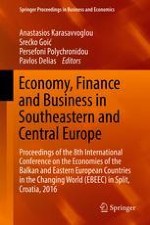2018 | OriginalPaper | Chapter
Metaeconomic Approaches in Global Management
Author : Antanas Buracas
Published in: Economy, Finance and Business in Southeastern and Central Europe
Publisher: Springer International Publishing
Activate our intelligent search to find suitable subject content or patents.
Select sections of text to find matching patents with Artificial Intelligence. powered by
Select sections of text to find additional relevant content using AI-assisted search. powered by
